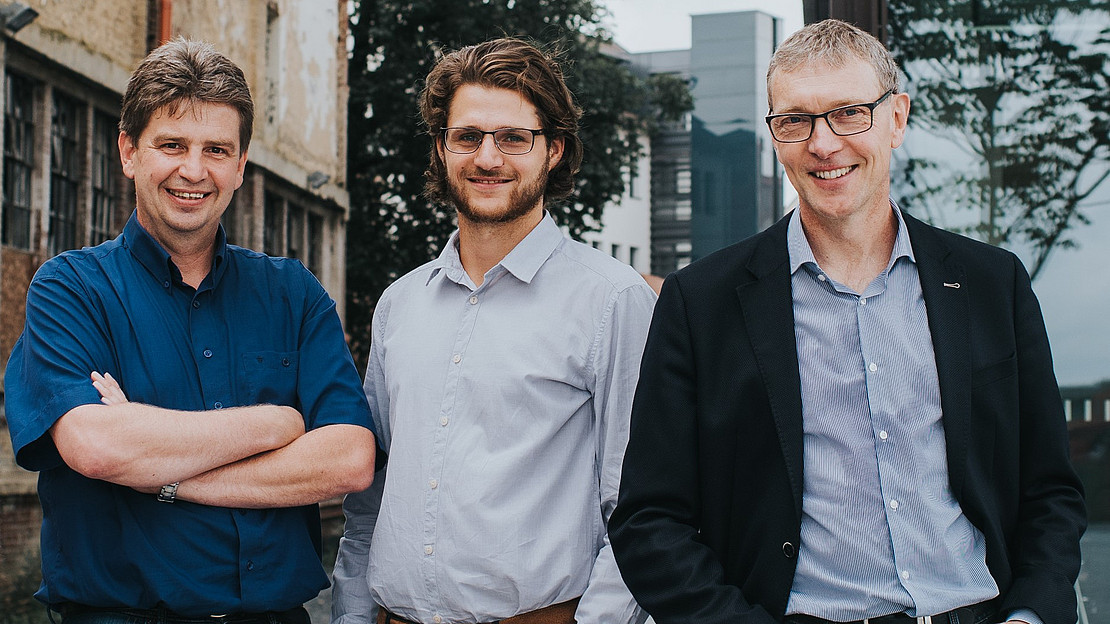This page contains automatically translated content.
Energy-saving measures at the University of Kassel are self-financing

In this research project, funded by the German Federal Ministry for Economic Affairs and Energy, the Department of Technical Building Equipment at the Faculty of Architecture - Urban Planning - Landscape Planning at the University of Kassel investigated how the intracting principle, already proven in municipalities, can be implemented in universities. At the same time, intracting was introduced as a pilot project at the University of Kassel, so that initial practical experience could be gained. On September 20, the research team led by Prof. Dr.-Ing. Jens Knissel presented the results at an online conference.
Intracting is a powerful tool, as the research project shows: Start-up funding multiplies its volume by a factor of 20 to 40 within 15 years due to the self-amplification effect, resulting in a gain for the university: after a start-up period, part of the saved energy costs goes back to the university budget. The other part is credited to an intracting cost center and reinvested in new energy-saving measures.
"Intracting is used to implement the many energy-saving measures at universities, some of which are very economical, and to advance climate protection," says Prof. Knissel. "In terms of the measures considered, energy consumption and thusCO2 emissions are reduced by 60 to 70 percent." For the total heat and electricity consumption of the buildings, a reduction of around 30 percent would be achieved at the University of Kassel. Intracting is thus an important component on the road toCO2 neutrality.
In addition to the lead department of technical building equipment, the departments of building physics, solar and systems engineering, microeconomics and empirical energy economics as well as the department of construction, technology and real estate at the University of Kassel were involved in the research project. The HIS HE - Institute for Higher Education Development (Hanover), the KEA Klimaschutz- und Energieagentur Baden-Württemberg (Karlsruhe) and the IWU Institut Wohnen und Umwelt (Darmstadt) collaborated outside the university.
The cdw-Stiftung gGmbH of SMA founders Günther Cramer, Peter Drews and Reiner Wettlaufer got involved in the activities by financing photovoltaic systems on buildings at Kassel University. This is because renewable energies can also be integrated into intracting and their expansion supported. In accordance with the intracting idea, the costs avoided by the self-used PV electricity are reinvested in new PV systems or energy efficiency measures.
In an action guide, Prof. Dr.-Ing. Jens Knissel and Marius Ehlert M. Sc. have now summarized the key steps and success factors for introducing intracting at a university. Interested parties will find concrete information on the necessary financial and personnel resources, framework conditions and repayment regulations.
Download the guide and the presentation slides
Publication:
Jens Knissel, Marius Ehlert: Action Guide Intracting at Universities - Continuous Increase of Energy Efficiency, DOI: 10.17170/kobra-202109274813
Contact:
Marius Ehlert | M.Sc.
Phone: +49 561 804 7457
Email: ehlert[at]uni-kassel.de
www.tga.uni-kassel.de
Press contact:
Dr. Andreas Gebhardt
University of Kassel
Communications, Press and Public Relations
Phone: +49 561 804-1961
E-mail: presse[at]uni-kassel[dot]de